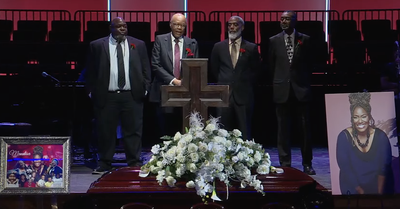WASHINGTON (ABP) -- Some in the Religious Right support President Bush's proposal to invade Iraq, but other religious leaders say it's too early to rush into war.
Bush and congressional leaders are currently wrangling over the terms and extent of a resolution authorizing the use of force against Iraq, which is suspected of harboring chemical, biological or nuclear weapons. Bush also faces stiff opposition from the United Nations Security Council on a similar resolution.
The White House has argued that Iraqi leader Saddam Hussein might use "weapons of mass destruction" against his own people, neighboring nations or even targets in the United States. Bush advocates striking Iraq to remove Hussein from power before he attacks anyone else.
"The dangers we face will only worsen from month to month and year to year," Bush said Sept. 28 in a radio address to the nation. "To ignore these threats is to encourage them -- and when they have fully materialized, it may be too late to protect ourselves and our allies."
Bush's policy of "pre-emption" marks a departure from previous U.S. foreign policy of containment of potential foreign threats and deterrence of rogue states.
Richard Land, president of the Southern Baptist Convention's Ethics and Religious Liberty Commission, says Bush's approach meets "just war" criteria used for centuries to determine whether military action is moral.
"I believe just-war theory first of all says it must be defensive. And I believe we are defending ourselves against several acts of war by a man who does not keep treaties and who has already used weapons of mass destruction," Land said during a recent appearance on the PBS television program Religion and Ethics Newsweekly.
Land said he would like to see support from the U.N. Security Council for a pre-emptive approach, but the U.S. has "appropriate authority" to proceed with or without international support.
Prominent Southern Baptist pastor Jerry Falwell also supports Bush's policies and has criticized U.N. and congressional leaders for their "wait-and-see" approach.
Many other religious leaders, however, say the Bush administration has not made a case for meeting "just war" criteria.
Representatives from several different Protestant and Eastern Orthodox denominations lobbied Congress in late September against giving Bush wide authority to wage a pre-emptive war against Iraq. The National Council of Churches organized the lobbying effort.
"Pre-emptive military action now being contemplated by the [Bush] administration cannot be morally justified," said Bob Edgar, the NCC's general secretary and a former member of Congress.
Edgar said that by attacking Iraq, the U.S. would "present a model of aggression that may encourage other nations to attack neighboring countries that threaten them."
Earlier, the heads of 48 Protestant and Orthodox denominations and Catholic religious orders wrote Bush to oppose unilateral action.
The religious leaders said Bush's approach "could result in a large number of civilians being killed or wounded, as well as increasing the suffering of multitudes of innocent people."
"It is detrimental to U.S. interests to take unilateral military action when there continues to be strong multilateral support for a new weapons inspection regime and when most governments in Europe and the Middle East resist supporting military action," they said.
The leaders also said U.S. military action might "further destabilize" the Middle East, already the site of intense conflict between Israelis and Palestinians.
Baptists signing the letter included Lindsay Penn-Matheson, president of the board of directors of the Baptist Peace Fellowship of North America; Stan Hastey, president of the Alliance of Baptists; and William Shaw, president of the National Baptist Convention, USA.
Another group of 100 Christian ethicists -- including some conservative evangelicals -- issued a one-sentence declaration opposing the war.
"As Christian ethicists, we share a common moral presumption against a pre-emptive war on Iraq by the United States," said the statement, signed Sept. 25.
Signers included Beth Newman of Baptist Theological Seminary at Richmond; Glen Stassen at Fuller Theological Seminary, formerly of Southern Baptist Theological Seminary; Tokunbo Adelekan of Eastern Baptist Theological Seminary, an American Baptist school; William Tillman of Hardin-Simmons University; Paul Lewis of Mercer University; and Andrew Pak of Golden Gate Baptist Theological Seminary.










